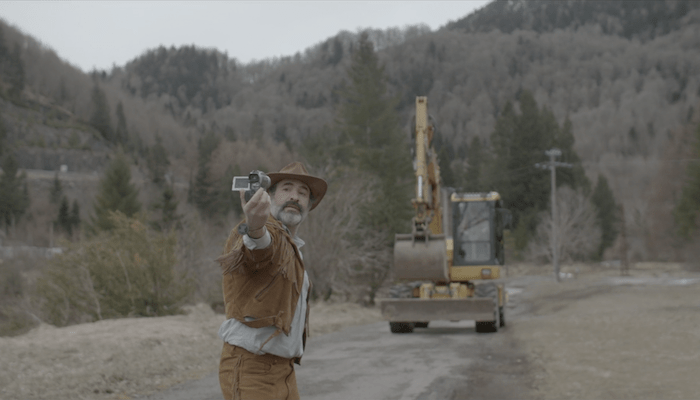Quentin Dupieux’s absurdist style is definitely his comfort clothes, but he’s at his most fashionable when his weird is also self-critical. His latest outing, Deerskin, is him digging through his closet to find something that’s both appropriately stylish and classically bonkers. Deerskin follows the odd life of Georges (played by Jean Dujardin), a middle-aged man with an ineptitude for social interactions and a disdain for his current jacket. On the lam from his estranged wife, Georges responds to a classified ad for an authentic deerskin jacket. The moment he tries the jacket on he becomes enamored with it, and uses the last of his pocket money to buy it (which also comes with a free camcorder, courtesy of the kind elderly seller (Albert Delpy)).
Advertisement
With jacket and camcorder in tow, Georges settles in small mountain town to ride out his anxiety. His fondness of the jacket continues to grow over time, and deerskin soon becomes his material of choice. Through the camcorder he documents his evolving relationship to his jacket, as well as his jealousy towards all others’ jackets. His bizarre behavior attracts the attention of the local bartender Denise (Adèle Haenel), an aspiring video editor who’s looking for a big break. Georges convinces Denise that he’s a serious filmmaker and employs her editing services to keep her from prying too deep into his jealousy complex. But the more she edits the more she inevitably digs into his psyche, and demands that his film become more intricate…more immersive…more “real”. From there Georges goes on an absurd conquest to rid the world of jackets by any means necessary, and the line between his own reality and that of the film becomes as frayed as a suede overcoat. Deerskin is a return to Dupieux (also known by his musical pseudonym Mr. Oizo) operating at his most introspective level. As he did with his absurdist masterpiece Rubber, he digs deep into the very function of cinema itself and dissects the very rituals we’ve crafted around it. Dupieux inherently ends up asking why we, as audiences, revere silent submission and unquestioning acceptance as events unfold on-screen. Or, relatedly, why we demand a strict cause-effect relationship for everything with which we’re presented. Dupieux also interrogates the extent of cinematic craftsmanship, with Georges wondering if committing images to tape is enough to constitute filmmaking. “A guy who films is like a guy who makes a film,” he argues with himself. “I’m not so sure….It’s true!” Denise is also attuned to this conundrum, but from the opposite angle – she argues that you need an imagination, or a “special machine”, to put together a film, and nothing sensible can be made from simply slapping images together. Georges’ ideology is symbolic of cinema as spontaneity, whereas Denise is that of hardcore determinism – everything is “real” versus everything is “staged”, and the lack of gray area in-between. The spirit of Eisenstein is both very proud and very upset right now. The profoundness of Dupieux’s vision – or the frustration, depending on how you react to it – is his lack of commitment to either position. Rather than make a firm statement he floats in the “both sides” ambiguity of artistic interpretation, allowing us to excavate quite a few thematic riches from his works if we so wish. This sort of symbiotic relationship of meaning and metaphor is vital to the functionality of cinema but usually remains hidden in the shadows; Dupieux’s filmography yanks it out into the stark light of day. Like Georges’ eventual reliance on the camcorder as a social divider, Deerskin brings forth cinema’s proclivity to condone our strange societal assumptions of purpose as well as our voyeuristic tendencies. Deerskin is also a return to Dupieux’s continued fascination with pareidolia – or, at least humanity’s subconscious obsession with it as a psychological default. Whether it’s a psychokinetic rubber tire named “Robert” or a deerskin jacket with a power complex, there’s an undercurrent of our narrative need to graft meaning onto action by virtue of identity. Tragedy cannot happen because of the inherent cruelty of the universe, it must happen because of an evil being – or vice versa, in order to prevent ourselves to succumbing to the temptation to rehabilitate the worst who walk among us. Deerskin takes that even further into the realm of superficial consumerism, with Georges unable to contain his pride and jealousy in other people’s fashions (and mere existences), though it arguably does so without too steadfast of a conviction. Deerskin it isn’t quite as thoughtfully self-aware as Rubber, and it’s not nearly as amusing, either. It is more narratively contained and thus attracts this (somewhat unfair) assumption of professional construction. But it’s also way drier and stylistically tight-lipped (at least until the final act). But it’s also way more intriguing than Dupieux’s mid-career stretch, which saw such outings as Wrong and Wrong Cops delving into a near-empty nihilistic echo chamber. Deerskin won’t make waves off the runway, but Dupieux’s dedicated fans will be pleased that his label has returned to comfortable fit and form. Rating: 6/10 Leave your thoughts on this Deerskin review and the film below in the comments section. Readers seeking to support this type of content can visit our Patreon Page and become one of FilmBook’s patrons. Readers seeking more film reviews can visit our Movie Review Page and our Movie Review Pinterest Page. Want up-to-the-minute notifications? FilmBook staff members publish articles by Email, Twitter, Instagram, Tumblr, Pinterest, and Flipboard.
